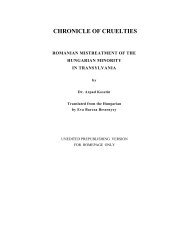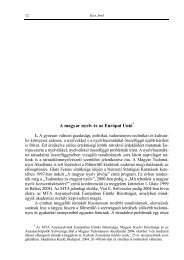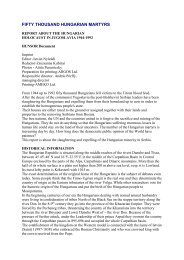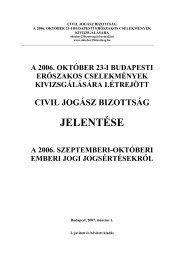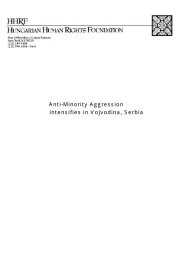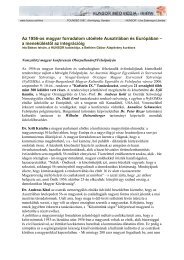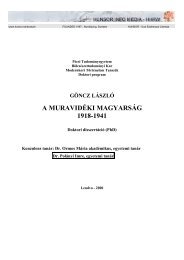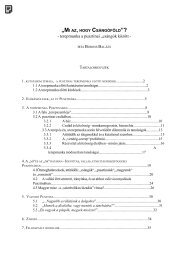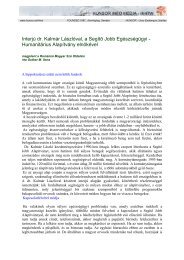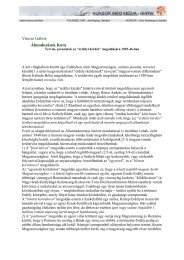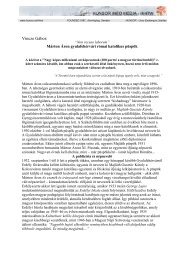culpability or participation are thus out of the question. The telegram of the accused on January22, 1942, cannot be regarded as instigation either, as it was settled above by the149Court.The accused did not hurry to punish the criminals with the force he would have had touse, as it would have been his duty under such circumstances, since he had no doubt later ofwhat had happened in the South. These events have influenced the nation's moral and also itsfinancial existence. The question arose, are we going to become the object of hatred among thenations?Under such circumstances, the accused put the investigation of the case in the hands of militaryleaders, whose impartiality would have been suspected by any sober outside observer. Theywere the most likely to have participated directly or indirectly in the scandalous operations.Instead of arresting those who were obviously responsible for the events as militarycommanders, the accused commissioned the principal criminal to undertake the enquiry. Beforethe watchful eyes and obvious disapproval of the international public opinion, he helped tocover up the case, which eventually led to the barring of the indictment. The problem was ofsuch importance that not a moment of delay should have been allowed; old people and childrenhad been murdered. There had been a "campaign" against them. In such an important case allother aspects are negligible. He ought to have struck instantly, thus making it clear, that theHungarian government had no quarrel with the Serbs, was ready to support the minority not onlywith words but with action also. The cover-up of the case has been more harmful thanadvantageous.There was no doubt about the series of crimes that took place. The punishment should havebeen immediate and with deterrent strength, as every sober and honest Hungarian and the wholeworld's public opinion expected it to be. It was evident that a treacherous clique opposed itsown nation, some officers or gendarme commanders may commit such a crime, but theHungarian nation and its government would not stand for it. It is the exposure, the completeopenness in the handling of the case,that would have guaranteed a fair assessment of the tragedyin the Western public and official oppinion.The glossing over and the attempted concealment of the case created the misconception that ithad not been an arbitrary but tolerated course of action. It is well known what a great harm befellthe Hungarians. The delayment of the case for weeks or months, degenerated into such aninternational scandal that its consequences burdened the Hungarian nation for a long time.150The judgement of the People's Court was, for those who were trying to cover up the crimesof some high ranking officers who later joined the German service. The welfare of thesecriminals was more important than the interests and reputation of the Hungarian nation.He had the chance to take effective measures to punish the guilty. Instead he acted in anindecisive, harmful way. If he were hindered, should have resigned at once, proving that a
esponsible Hungarian soldier does not take part directly or indirectly in the cover-up of suchcrime.The massacres at Zabalj and Novi Sad could have only been regarded as ordinary massmurders ordered by some individuals in the spot, and not the manifestation of official Hungarianpolicy. Measures should have been taken according to this. The People's Court denounced theprocedure used, and also the accused as a participant.The guilt of the accused is evident in the fact that even when he had a clear picture of the eventsin the South, he submitted a report to the regime, but pleaded for a cover-up. Even afterreinstituting the legal procedures, he did not order the arrest of the accused principalcriminals, providing them an opportunity to escape to Germany.In the opinion of the People's Court, General Szombathelyi's deed involves the characteristicsof the crime of dereliction of duty by an official, defined in the first paragraph of the Penal CodeArticle 478. As a government official, he abused his official authority with the purpose ofexempting someone from lawful punishment. He neglected the fulfillment of his official duty bypreventing the prosecution of criminals. The argument that politics necessitated this, or that heacted under German pressure, cannot justify his reprehensible participation in the cover-up of thecase, and may be considered merely as a mitigating circumstance. The verdict was ten yearsimprisonment.The People's prosecutor lodged an appeal against the verdict. The National People'sCourt changed the decision of the People's Court in May 22, 1946, and sentenced the late Chiefof the General Staff to life imprisonment. It is worth quoting again from the reasons adduced,which judged Szombathelyi's attitude more strictly:"It is essential to establish the responsibility of the accused in the events at Novi Sad.151It is impossible that a leader of the highest rank, concerned with an illegal action thattook the lives of thousands which he could have prevented by intervening; may successfullyrefer to his accepting the repeated false reports of the murderers' instigators and the murderersthemselves without criticism and control. He believed them at the time when the honourablepublic opinion of the whole country was scandalized by the committed dishonours. Thecomrades' reports were more convincing for him than the bloody facts.Before the culmination of the atrocities in January 22, 1942, he sent a telegram to the leader ofthe massacre-called-raid with an order that the striking injustices are to be avoided. Grassy, oneof the direct culprits related this determinedly, and the National Council does not find thePeople's Court's scepticism towards his confession reasonable, because the accused himselfconcedes on the 28th page of his remarks, that under the effect of Czeydner's report he may havesent such a telegram to him on January 22.So even if at the time of ordering the Armed Forces and the commissioning of Grassy to lead theraid, it was far from the intentions of the accused, that these Armed Forces should carry out massmurders at Novi Sad. By the fact that he did not avoid the possibility of further murders with thecancelling of the whole operation; and that he did not order the most rigorous, objectiveenquiry; and did not draw the conclusions with the merciless exercising of his judicial power; hehas become responsible both of the previous and the later unlawful acts.
- Page 3 and 4:
Library of Congress Catalogue Card
- Page 5 and 6:
Mutilation of the hands or feet wit
- Page 7 and 8:
they wanted to belong. On the annex
- Page 9 and 10:
individuals, then shooting them by
- Page 11 and 12:
the Russians and under their protec
- Page 13 and 14:
22PEOPLE OF BEZDAN1.On a May aftern
- Page 16 and 17:
26that those people all fell victim
- Page 18 and 19:
ack a 13 year-old boy to the soccer
- Page 20 and 21:
Russian officers cursed and told th
- Page 22 and 23:
Jani was set free for he had been a
- Page 24 and 25:
There were some people who, in spit
- Page 26 and 27:
March 12, 1945. The relatives of th
- Page 28 and 29:
Ferenc Csapo, 33 Mihaly Miovacs, 18
- Page 30 and 31:
Having heard about the advance of t
- Page 32 and 33:
"On November 3, I got up at five in
- Page 34 and 35:
The vicar would come every night. H
- Page 36 and 37:
hand. Raising it to his mouth, he d
- Page 38 and 39:
"24th October, 1944. Yesterday was
- Page 40 and 41:
"I have only one chance to be sacri
- Page 42 and 43:
The data, which shows that on the s
- Page 44 and 45:
all the captured Serbs, as neither
- Page 46 and 47:
Before and during World War II, the
- Page 48 and 49:
would order fire in an instant. Wit
- Page 50 and 51:
Our house looked out over the main
- Page 52 and 53:
He had just arrived home after thre
- Page 54 and 55:
28. Jozsef Pasztor, 34 56. Albert G
- Page 56 and 57:
The OZNA officer, who exhumed a mas
- Page 58 and 59:
7917 year old Karoly and 8 year old
- Page 60 and 61: 82FROM SZENTFULOP TO THE GAKOVA CAM
- Page 62 and 63: My mother died on January 4, 1946.
- Page 64 and 65: Jozsi, the leader of our committee
- Page 66 and 67: his own grave, then machine gunned
- Page 68 and 69: driving a wheelbarrow on the sidewa
- Page 70 and 71: "Now that's exactly what we needed
- Page 72 and 73: 15 Istvan Polyakovics, Zenta, 18861
- Page 74 and 75: idge was built (from several rows o
- Page 76 and 77: There is a common opinion among the
- Page 78 and 79: The Catholics of the village were o
- Page 80 and 81: and their supporters. On one occasi
- Page 82 and 83: "My younger brother, Bandi, was tak
- Page 84 and 85: two young instructors staying in he
- Page 86 and 87: In Tunderes (Vilova) there was no o
- Page 88 and 89: weeks spent starving, laying on str
- Page 90 and 91: 121PACSERAt Pacser sixteen Serbians
- Page 92 and 93: piece of land, there are three rows
- Page 94 and 95: "I understood that through the OZNA
- Page 96 and 97: took the priest under their protect
- Page 98 and 99: "We set off from Hadikliget on Octo
- Page 100 and 101: everyone to the front! The Party us
- Page 102 and 103: 137REPORT OF LOSSESIn addition to o
- Page 104 and 105: 141Source: Zlocini okupatora u Vojv
- Page 106 and 107: well as in words, that there had be
- Page 108 and 109: The American military forces delive
- Page 112 and 113: The accused did not make use of his
- Page 114 and 115: the spirit of revenge among the Hun
- Page 116 and 117: considered all the claims of Hungar
- Page 118 and 119: The People's Court of Budapest just
- Page 120 and 121: From then on all hell breaks loose.
- Page 122 and 123: Recommended readingeRudolf Kiszlion



